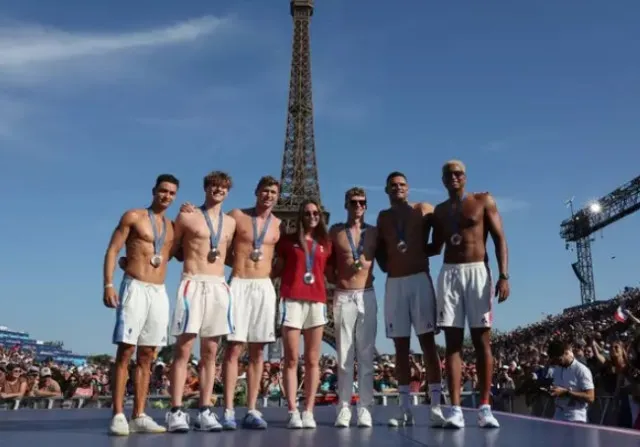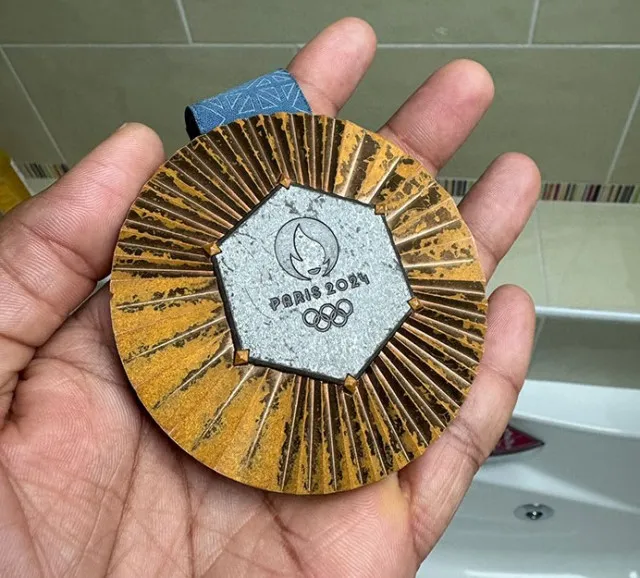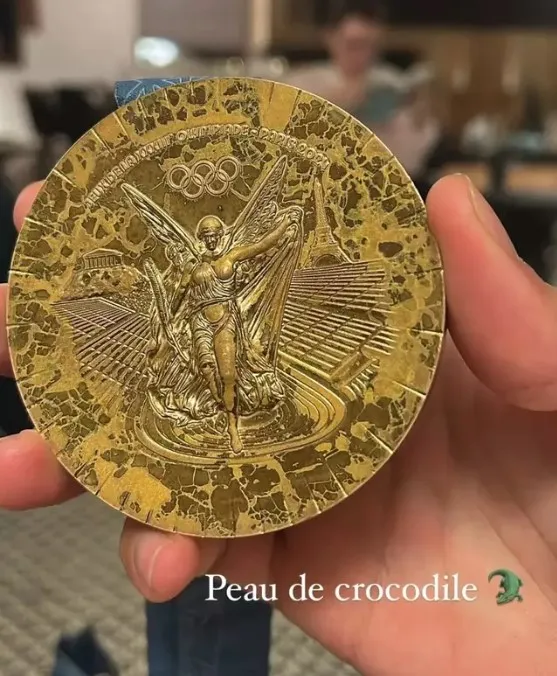Five months after the curtain closed on the 2024 Paris Olympics, a wave of discontent has emerged from the very athletes who achieved the ultimate glory—Olympic medalists. Reports are flooding in about the disappointing state of the medals, with some winners taking to social media to express concerns over their rapidly deteriorating awards. What should have been lifelong treasures of triumph have instead become a topic of controversy.
Let’s explore the unfolding drama, the experiences of the affected athletes, and what this situation reveals about the craftsmanship behind the medals of the Paris 2024 Games.

Write 5 photo captions based on each paragraph of this article, each photo caption should be about 10 words. Image Credit: Getty
The Symbol of Glory That’s Fading Too Fast
Olympic medals are much more than pieces of metal; they’re lifelong symbols of sacrifice, hard work, and success on the world’s biggest stage. Athletes train for years to earn these coveted prizes, with dreams of cherishing them for decades to come. However, for some Paris 2024 medalists, these dreams are being tarnished—quite literally.
Athletes have reported that their medals are already showing signs of wear and tear, including fading, scratches, and even discoloration. The premature deterioration has overshadowed the initial joy of receiving these prestigious awards, leaving many to question the quality of the medals crafted for the games.

French swimmers share photos of worn and faded bronze medals. Image Credit: yoyo.2911
Athletes Speak Out: Medals “Aging Like Crocodile Skin”
The conversation around the disappointing state of the medals gained traction when French swimmers Clément Secchi and Yohann Ndoye-Brouard shared their experiences online. Secchi posted images of his bronze medal, comparing its scaly, faded appearance to “crocodile skin.” He expressed disbelief that such wear and tear could occur so soon, adding that the medal looked as if it had aged decades instead of just months.
Ndoye-Brouard echoed Secchi’s sentiments, humorously suggesting that his medal appeared more suitable for the 1924 Olympics rather than the 2024 Games. Their posts went viral, sparking a wave of similar complaints from other athletes around the world.
Complaints Pour in from Across the Globe
French swimmers weren’t the only ones dissatisfied with their medals. Athletes from various countries and disciplines shared their frustrations, painting a bleak picture of the medals’ durability.
- Nyjah Huston (USA, Skateboarding): The American skateboarder expressed disappointment with his bronze medal, which he claimed looked “worn out” just a week after receiving it. Huston joked that the medal “looked like it had been to war and back” after minimal use.
- Rebeca Andrade (Brazil, Gymnastics): Despite earning gold, Andrade reportedly refrained from wearing her medal due to noticeable scratches. For an athlete who had achieved the pinnacle of her sport, this defect dampened the joy of her accomplishment.
- Viktor Axelsen (Denmark, Badminton): Axelsen compared his Paris 2024 medal to one he received during the Tokyo 2021 Olympics. The Danish athlete pointed out that his older medal appeared to be in far better condition than the one he had just received in Paris.
These complaints highlight a widespread issue, suggesting that the problem isn’t isolated to a handful of defective medals but potentially affects a significant portion of the awards distributed during the Games.
😭😭 Paris 1924 pic.twitter.com/WzfoV3ECQt
— Yohann Ndoye Brouard (@yohann_2911) December 28, 2024
Social Media Amplifies the Outcry
The issue gained even more attention thanks to the power of social media. Athletes shared images and videos of their tarnished medals, sparking debates among fans and experts alike. What started as individual grievances soon turned into a collective movement, with users questioning the quality control measures implemented for such prestigious awards.
Fans joined the conversation with humor and frustration. Some joked that the medals seemed to have skipped quality assurance entirely, while others criticized the Paris 2024 organizing committee for failing to uphold the Olympics’ reputation for excellence.
Official Response from Paris 2024
The backlash prompted a response from officials associated with the Paris 2024 Games. In a public statement, organizers acknowledged the complaints and reassured athletes that the issue was being taken seriously. They emphasized that the medals represent the pinnacle of achievement for the athletes and should reflect the prestige of the Olympic Games.

Nyjah Huston describes his worn bronze medal just weeks after receiving it. Image Credit: Instagram/@clem_secchi
The Paris 2024 committee announced that it was collaborating with the Monnaie de Paris—the organization responsible for producing the medals—to investigate the problem. A spokesperson stated that any defective medals would be replaced at no cost to the athletes. They also assured that the replacement medals would be identical to the originals, including personalized engravings.
What Went Wrong? Questions Surround Medal Craftsmanship
While investigations are ongoing, many are questioning how the medals fell short of expectations. The Paris 2024 medals were lauded for their sustainable design, with materials sourced from recycled metals, including old electronics. This eco-friendly initiative was praised for its innovation, but it may also hold clues to the medals’ premature deterioration.
Experts speculate that the recycling process or the type of finish used on the medals might have contributed to their lack of durability. Additionally, the choice of materials may not have been robust enough to withstand regular handling, exposure to sweat, and environmental conditions.

Image Credit: Getty
As the Monnaie de Paris continues its investigation, the incident serves as a reminder of the delicate balance between sustainability and quality in manufacturing processes.
The Impact on Athletes’ Experiences
For many athletes, the condition of their medals goes beyond surface-level aesthetics. An Olympic medal is more than a trophy—it’s a symbol of years of dedication and sacrifice. When that symbol doesn’t live up to its expectations, it can diminish the sense of pride and accomplishment that comes with it.
Brazilian gymnast Rebeca Andrade expressed disappointment that her gold medal, which represented one of the proudest moments of her life, was marred by scratches. Similarly, French swimmer Clément Secchi lamented that his medal looked older than his parents’ antiques, a comment that underscores how personal these issues are for the athletes involved.
A Lesson for Future Games
The Paris 2024 medal controversy is a wake-up call for future Olympic organizers. As the spotlight continues to shine on the quality of the medals, the incident underscores the importance of rigorous quality control and durability testing in the production process.

Paris 2024 officials respond, promising to replace damaged medals. Image Credit: yoyo.2911
While sustainability is an admirable goal, it should never come at the expense of the quality and longevity of an Olympic medal. These awards are meant to last a lifetime, serving as cherished reminders of athletes’ incredible achievements.
Conclusion: A Legacy Tarnished, But Fixable
The Paris 2024 Olympics were a celebration of athletic excellence, but the controversy surrounding the medals has left an unfortunate blemish on the Games’ legacy. For athletes, the medals are more than just pieces of metal—they’re symbols of hard work, sacrifice, and triumph. The rapid deterioration of these awards has cast a shadow over their achievements, prompting both frustration and disappointment.
However, the commitment from Paris 2024 organizers to replace defective medals offers a silver lining. By addressing the issue head-on, they have an opportunity to restore faith in the Olympic tradition and ensure that athletes receive awards worthy of their efforts.
As the story continues to unfold, one thing is clear: the athletes who competed in Paris deserve nothing less than medals that reflect the prestige and honor of the Olympic Games. Let’s hope that future Games learn from this experience, prioritizing both sustainability and craftsmanship to uphold the legacy of excellence that the Olympics represent.